Making Correct and Effective Sentences
- 格式:doc
- 大小:104.50 KB
- 文档页数:24
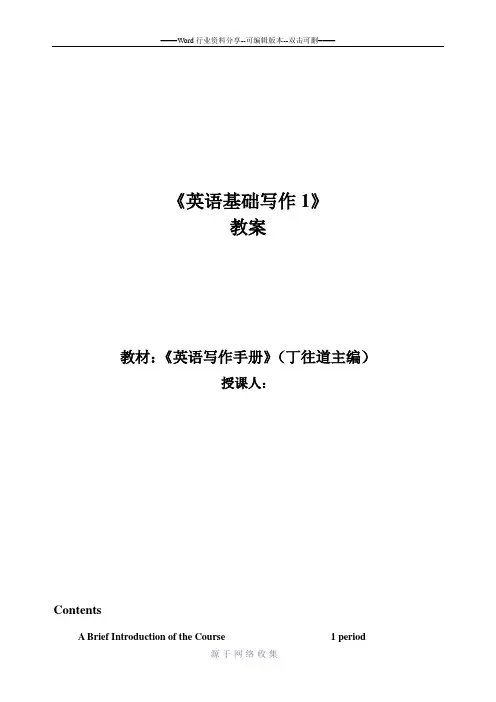
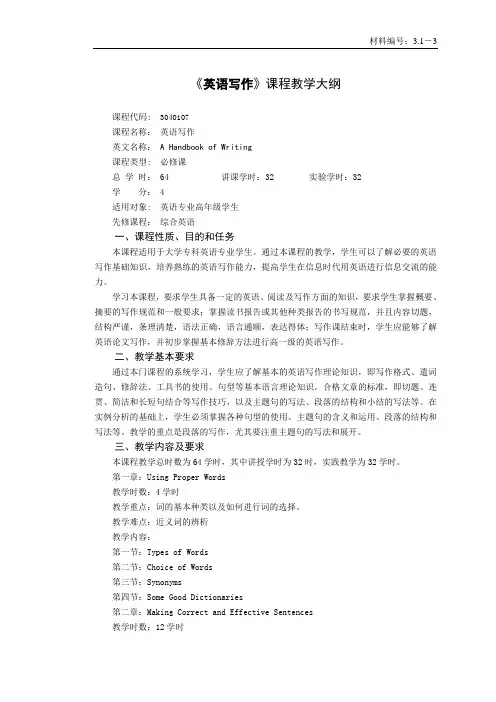
《英语写作》课程教学大纲课程代码: 3040107课程名称:英语写作英文名称:A Handbook of Writing课程类型: 必修课总学时: 64 讲课学时:32 实验学时:32学分: 4适用对象: 英语专业高年级学生先修课程:综合英语一、课程性质、目的和任务本课程适用于大学专科英语专业学生。
通过本课程的教学,学生可以了解必要的英语写作基础知识,培养熟练的英语写作能力,提高学生在信息时代用英语进行信息交流的能力。
学习本课程,要求学生具备一定的英语、阅读及写作方面的知识,要求学生掌握概要、摘要的写作规范和一般要求;掌握读书报告或其他种类报告的书写规范,并且内容切题,结构严谨,条理清楚,语法正确,语言通顺,表达得体;写作课结束时,学生应能够了解英语论文写作,并初步掌握基本修辞方法进行高一级的英语写作。
二、教学基本要求通过本门课程的系统学习,学生应了解基本的英语写作理论知识,即写作格式、遣词造句、修辞法、工具书的使用、句型等基本语言理论知识,合格文章的标准,即切题、连贯、简洁和长短句结合等写作技巧,以及主题句的写法、段落的结构和小结的写法等。
在实例分析的基础上,学生必须掌握各种句型的使用、主题句的含义和运用、段落的结构和写法等。
教学的重点是段落的写作,尤其要注重主题句的写法和展开。
三、教学内容及要求本课程教学总时数为64学时,其中讲授学时为32时,实践教学为32学时。
第一章:Using Proper Words教学时数:4学时教学重点:词的基本种类以及如何进行词的选择。
教学难点:近义词的辨析教学内容:第一节:Types of Words第二节:Choice of Words第三节:Synonyms第四节:Some Good Dictionaries第二章:Making Correct and Effective Sentences教学时数:12学时教学重点:1. 句子结构的完整性、主谓的一致性、如何用连词连接句子、复合句中的主句以及正确使用时态;2.有效的句子,包括句子的统一性、连贯性、准确性;句子的变化和句子的强调。
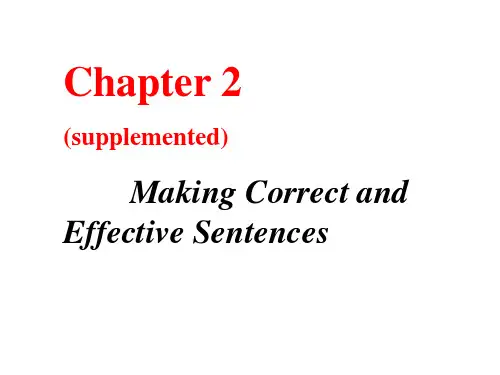
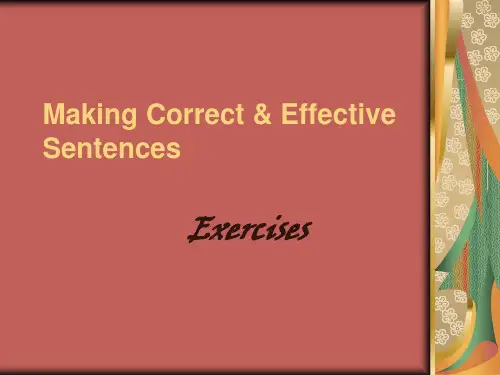
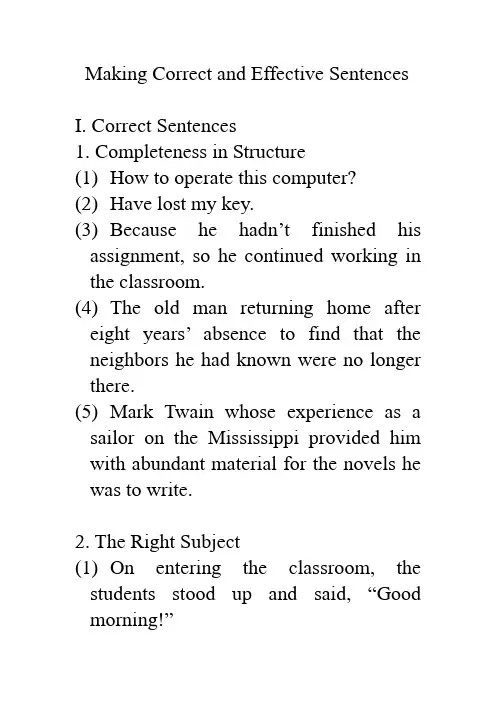
Making Correct and Effective SentencesI. Correct Sentences1. Completeness in Structure(1)How to operate this computer?(2)Have lost my key.(3)Because he hadn’t finished his assignment, so he continued working in the classroom.(4)The old man returning home after eight years’absence to find that the neighbors he had known were no longer there.(5)Mark Twain whose experience as a sailor on the Mississippi provided him with abundant material for the novels he was to write.2. The Right Subject(1)On entering the classroom, the students stood up and said, “Good morning!”(2)After finishing her composition, the translation exercise was taken up.(3)Hurrying to the conference room, no one was there.(4)Returning home after work, supper was waiting for him in the kitchen. (5)To look at a map, the importance of this new railway will be seen.3. Agreement Between the Subject and the Predicate Verb(1)His whole family is/are here with him.(2)The majority of the students taking this exam is/are girls.(3)These cattle belong/belongs to that ranch.(4)There is/are an enormous audience in the hall.(5)The audience was/were shocked by the scenes of violence in the film.4. Clear Pronoun Reference(1)I’m going to talk on jazz music for he is a well-known composer.(2)Leave out the word in that sentence because it is too difficult.(3)She told my sister that her idea was practicable.(4)He is the man recommended by Mr. Smith who knows how to fix cars.5. Ending Sentences with Full StopsI set out for the biggest bookstore in town, at the school gate I saw a girl of my class, she was going there, too, we decided to go together, we walked, the bookstore was not far away.6. Joining Clauses with Conjunctions (1)She enjoys listening to pop music, her sister likes classical music better.(2)She speaks English fluently, she speaks French quite well.(3)The planes for the building are not yetready, the construction can’t start very soon.7. A Main Clause in a Complex Sentence (1)Because he had not heard about that important decision.(2)Whatever the director said at the conference.(3)The man we could find for the job. 8. Proper Use of Comparisons(1)Her English is much better than I.(2)The language of Henry James is more elaborate than Ernest Hemingway. (3)But for many, the fact that poor people are able to support themselves almost as well without government aid as they did with it is in itself a huge victory.但在许多人看来,穷人能不靠政府救济养活自己,而且生活得几乎和过去依靠政府救济时生活得一样好,这件事本身就是一个巨大的胜利。
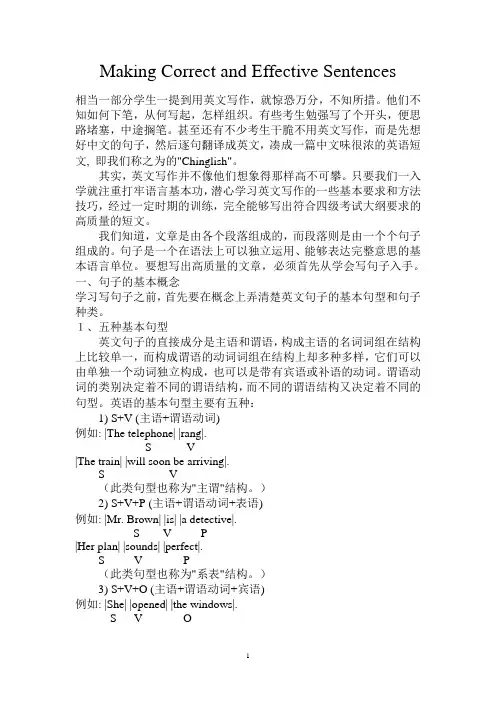
Making Correct and Effective Sentences相当一部分学生一提到用英文写作,就惊恐万分,不知所措。
他们不知如何下笔,从何写起,怎样组织。
有些考生勉强写了个开头,便思路堵塞,中途搁笔。
甚至还有不少考生干脆不用英文写作,而是先想好中文的句子,然后逐句翻译成英文,凑成一篇中文味很浓的英语短文, 即我们称之为的"Chinglish"。
其实,英文写作并不像他们想象得那样高不可攀。
只要我们一入学就注重打牢语言基本功,潜心学习英文写作的一些基本要求和方法技巧,经过一定时期的训练,完全能够写出符合四级考试大纲要求的高质量的短文。
我们知道,文章是由各个段落组成的,而段落则是由一个个句子组成的。
句子是一个在语法上可以独立运用、能够表达完整意思的基本语言单位。
要想写出高质量的文章,必须首先从学会写句子入手。
一、句子的基本概念学习写句子之前,首先要在概念上弄清楚英文句子的基本句型和句子种类。
1、五种基本句型英文句子的直接成分是主语和谓语,构成主语的名词词组在结构上比较单一,而构成谓语的动词词组在结构上却多种多样,它们可以由单独一个动词独立构成,也可以是带有宾语或补语的动词。
谓语动词的类别决定着不同的谓语结构,而不同的谓语结构又决定着不同的句型。
英语的基本句型主要有五种:1) S+V (主语+谓语动词)例如: |The telephone| |rang|.S V|The train| |will soon be arriving|.S V(此类句型也称为"主谓"结构。
)2) S+V+P (主语+谓语动词+表语)例如: |Mr. Brown| |is| |a detective|.S V P|Her plan| |sounds| |perfect|.S V P(此类句型也称为"系表"结构。
)3) S+V+O (主语+谓语动词+宾语)例如: |She| |opened| |the windows|.S V O|I| |have been looking for| |my lost bicycle|.S V O(此类句型也称为"动宾"结构。
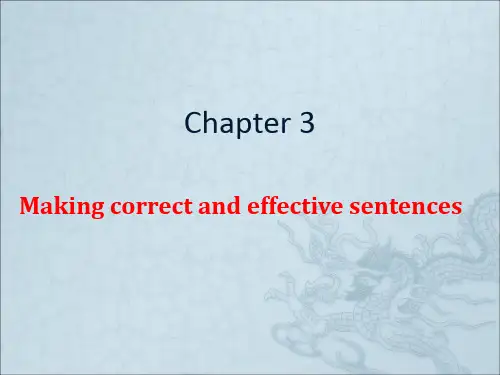
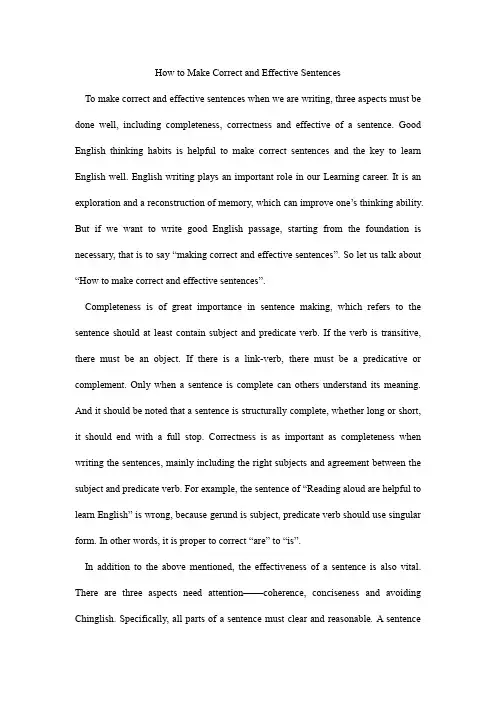
How to Make Correct and Effective SentencesTo make correct and effective sentences when we are writing, three aspects must be done well, including completeness, correctness and effective of a sentence. Good English thinking habits is helpful to make correct sentences and the key to learn English well. English writing plays an important role in our Learning career. It is an exploration and a reconstruction of memory, which can improve one’s thinking ability. But if we want to write good English passage, starting from the foundation is necessary, that is to say “making correct and effective sentences”. So let us talk about “How to make correct and effective sentences”.Completeness is of great importance in sentence making, which refers to the sentence should at least contain subject and predicate verb. If the verb is transitive, there must be an object. If there is a link-verb, there must be a predicative or complement. Only when a sentence is complete can others understand its meaning. And it should be noted that a sentence is structurally complete, whether long or short, it should end with a full stop. Correctness is as important as completeness when writing the sentences, mainly including the right subjects and agreement between the subject and predicate verb. For example, the sentence of “Reading aloud are helpful to learn English” is wrong, because gerund is subject, predicate verb should use singular form. In other words, it is proper to correct “are” to “is”.In addition to the above mentioned, the effectiveness of a sentence is also vital. There are three aspects need attention——coherence, conciseness and avoiding Chinglish. Specifically, all parts of a sentence must clear and reasonable. A sentenceshould contain no unnecessary words. For example, “my father is 45years old, and he is a teacher in the university. He read a lot of books every day to enrich himself” is not coherent and concise. The word that expresses “he” appears three times, which lead to the sentence is not clear. It would be better if it were changed to “My father, a teacher of 45years old in the university, read a lot of books every day to enrich him.”Due to the differences between Chinese and Chinese, the components of the two languages cannot be one-to-one corresponded. So Chinglish should also be avoided, otherwise, writing good sentences are difficult.It’s not hard to see that completeness, correctness and effective of a sentence are critical to make correct and effective sentences. Through the study of this course, I have a new understanding of English writing, and also have a strong interest to make sentences. For my current English level, my grammar is not well, which leads to I always can’t make correct and effective sentences. In response to this, I will work on grammar exercises to write better sentences. What’s more, long sentences are easy to write incorrectly for me. Therefore, I intend to learn to expand basic sentences into more elaborate ones so as to improve sentence writing ability step by step. Besides, I will read as much as I can and keep a diary in English to integrate English into daily life and to a foundation for future English learning.。
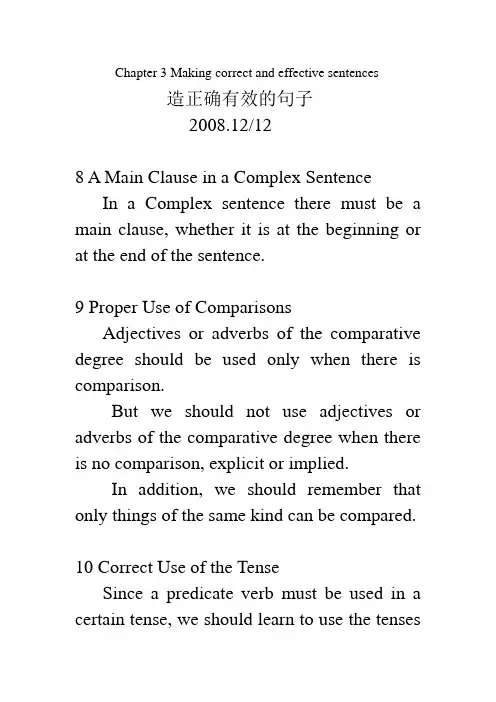
Chapter 3 Making correct and effective sentences造正确有效的句子2008.12/128 A Main Clause in a Complex SentenceIn a Complex sentence there must be a main clause, whether it is at the beginning or at the end of the sentence.9 Proper Use of ComparisonsAdjectives or adverbs of the comparative degree should be used only when there is comparison.But we should not use adjectives or adverbs of the comparative degree when there is no comparison, explicit or implied.In addition, we should remember that only things of the same kind can be compared.10 Correct Use of the TenseSince a predicate verb must be used in a certain tense, we should learn to use the tensescorrectly. Tenses tell the action of the verb takes place. Whenever we make a sentence, we should ask ourselves when the thing mentioned in the sentence happens, and use the right tense to report it. Perhaps the perfect tenses are more difficult than the other tenses and deserve greater attention. When we talk about something that happened in the past, but its result remains at present, we should use the present perfect.So far we have been talking about the requirements of correct sentences and a few common mistakes. There are of course many other types of mistakes. The best way to deal with them is to review grammar and study the entries we are not clear about in a dictionary, and observe the use of words, while we are learning new things, we can discover and correct our old mistakes.Focus 2 Coordination and SubordinationWhen we mention two or more things or ideas of equal importance, we often use coordination clause joined with a coordinating conjunction(and, but, or, nor, yet, so, or, for). This form or method is called coordination.When we express an important idea in a main clause and one or more less important ideas in subordinate clauses, we are using method of subordination.It is clear that the choice of coordination or subordination is mainly decided by the relationship between the ideas to be expressed. In each of the following sentences more than one fact or idea is mentioned.There is one thing we should pay attention to: the use of conjunctive verbs such as however, therefore, nevertheless, moreover, and besides.In the new versions not only clauses, but also parallel predicate verbs and participial and infinitive phrases are used in place of sentences. This shows that coordinating andsubordinating are not only ways of combining sentences. Sometimes complete sentences may be turned into phrases or single verbs without loss in meaning.Short sentences are not only emphatic, but effective in describing a series of quick movements and actions. Generally speaking, both short and long sentences should be used ; using one type of sentences continuously would be monotonous.Focus 3 Effective SentencesA correct sentence may not express the idea it intends to express very clearly or forcefully. Correctness alone can not make a good sentence. It has to be effective at the same time. Effective sentences have some or all the following qualities: unity, coherence, conciseness, emphasis, and variety.1 UnityUnity refers to two qualities: there is only one main idea in a sentence, and that idea iscomplete.This does not mean that all sentences have to be short and simple. It is often necessary to write a long sentence with many parts in it. Such a sentence expresses a central idea supported or modified by various subordinate ideas, or two or more related parallel ideas. In other words, ideas that are closely connected can be expressed in one sentence, while ideas that are not closely connected should not be put into one sentence.2 CoherenceCoherence means clear and correct arrangement of the parts of a sentence. Since the meaning of English sentences mainly depends on word order, the arrangement of the parts of a sentence is especially important to accurate expression of ideas. A coherent sentence is easy to understand and its meaning cannot be mistaken, because the connection between its words conforms to grammar rules and usage.A participial phrase expresses an action done by the person or the thing denoted by the noun it modifies.A modifier should be placed as close as possible to the word it modifies. If they are far from each other, misunderstanding may arise.Similarly, we should also be careful when we make changes in tense, voice and mood.Wherever possible, parallel ideas should be expressed in parallel constructions, which give the reader the feeling that the ideas are equally important.In short, coherence is essential to the accurate and clear expression of ideas. So it is a good habit to reread the sentences we have written to see whether they are coherence, and make necessary changes if they are not.3 ConcisenessWe write sentences to express ideas. The use of words in a sentence, therefore, is decided by the idea it expresses. Needless words do not help express ideas; on thecontrary, they obscure the meaning and confuse the reader. So one of the rules of sentence-making is to use only the necessary words, or as few words as possible so long as the meaning is fully expressed.But often we tend to put a superfluous多余的word here and there in a sentence. This habit may come from the way we talk. It is common in speaking to repeat a word, use words of similar meaning together, and change words we have said and even the structure of a sentence in the middle of it. But we should not do so in writing. This is possible because when we write we have time to check what we have written and delete all the words that are not needed for the expression of ideas, or to make our sentences concise.Here are a few hints for making concise and clear sentences;A, Use a pronoun instead of repeating a noun; B, Use a word instead of a phrase with the same meaning, and use a phrase instead of aclause with the same meaningC, Do not repeat words or phrases, if possible, in a sentence or in one that follows;D, Do not use different words or phrases with similar meanings in the same sentence;E, Do not repeat the same idea in different sentences except for emphasis.4 EmphasisWhen we talk, we emphasize an important idea by raising our voices or making a gesture. When we write, we also have ways to lay emphasis on certain words or phrases. PlacingThe end and the beginning of a sentence usually attract the reader’s attention, so important elements of a sentence should be put at these tao places, especially the end. Climactic sequenceIn enumerating列举things or ideas, we should start from the least important and end with the most important, or in the climactic高潮的sequence.The use of verbs in the active voiceVerbs are generally more emphatic than nouns or any other part of speech. SubordinationWe have talked about subordination and coordination. Subordinating a part of a sentence is a way of giving emphasis to the main idea in the sentence.Repeating important wordsRepetition as a rule should be avoided, but occasionally important words can be repeated for the sake of emphasis.Short sentencesShort sentences are often emphatic, especially after longer ones.Balanced sentencesA balanced sentence is one that consists of two parts of the same structure and roughly the same length, and with contrasted(or similar) ideas.Periodic sentences圆周句(指主要意义至句尾始明白的句子)A periodic sentence is one that is not complete in structure or meaning until it reaches the last word, which is the most important word of the sentence.A sentence in which the main clause or its predicate is withheld until the end; for example,周期句:主句或谓语在句末的句子;例如:Despite heavy winds and nearly impenetrable ground fog, the plane landed safely.尽管有强风和无法看透的地雾,飞机安全着陆When we read this sentence we are not kept in suspense for the main meaning, as we are when reading the periodic one, and we fell its force is weaker. But the loose sentence may sound more natural and may be easier to understand.Negative-positive statementsWhen a negative statement is followed by a positive one, the meaning is emphasized by the contrast.Rhetorical questions反问They are questions in form but emphatic statements in meaning. They are not asked to be answered.5 VarietyA series of sentences of the same structure and length with the same noun or pronoun as the subjects produce monotony. It is often good to vary structures and mix short and long, simple and compound or complex, loose and periodic sentences, so long as the meaning is properly expressed.。
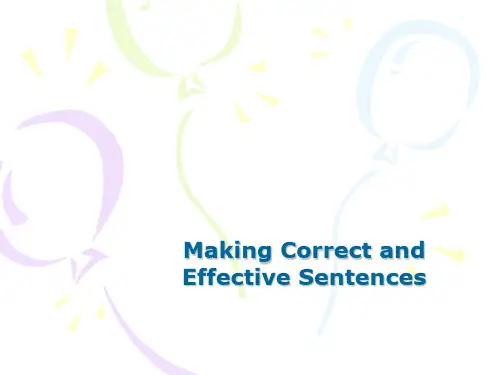
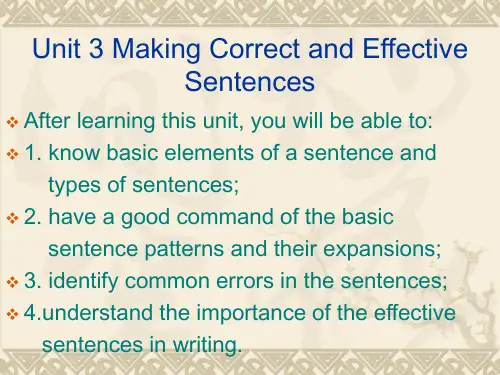
Chapter 3 Making correct and effective sentences造正确有效的句子3 ConcisenessWe write sentences to express ideas. The use of words in a sentence, therefore, is decided by the idea it expresses. Needless words do not help express ideas; on the contrary, they obscure the meaning and confuse the reader. So one of the rules of sentence-making is to use only the necessary words, or as few words as possible so long as the meaning is fully expressed.But often we tend to put a superfluous多余的word here and there in a sentence. This habit may come from the way we talk. It is common in speaking to repeat a word, use words of similar meaning together, and change words we have said and even the structure of a sentence in the middle of it. But we should not do so in writing. This is possible because when we write we have time to check what we have written and delete all the words that are notneeded for the expression of ideas, or to make our sentences concise.Here are a few hints for making concise and clear sentences;A, Use a pronoun instead of repeating a noun; B, Use a word instead of a phrase with the same meaning, and use a phrase instead of a clause with the same meaningC, Do not repeat words or phrases, if possible, in a sentence or in one that follows;D, Do not use different words or phrases with similar meanings in the same sentence;E, Do not repeat the same idea in different sentences except for emphasis.4 EmphasisWhen we talk, we emphasize an important idea by raising our voices or making a gesture. When we write, we also have ways to lay emphasis on certain words or phrases. PlacingThe end and the beginning of a sentence usually attract the reader’s attention, soimportant elements of a sentence should be put at these tao places, especially the end. Climactic sequenceIn enumerating列举things or ideas, we should start from the least important and end with the most important, or in the climactic高潮的sequence.The use of verbs in the active voiceVerbs are generally more emphatic than nouns or any other part of speech. SubordinationWe have talked about subordination and coordination. Subordinating a part of a sentence is a way of giving emphasis to the main idea in the sentence.Repeating important wordsRepetition as a rule should be avoided, but occasionally important words can be repeated for the sake of emphasis.Short sentencesShort sentences are often emphatic, especially after longer ones.Balanced sentencesA balanced sentence is one that consists of two parts of the same structure and roughly the same length, and with contrasted(or similar) ideas.Periodic sentences圆周句(指主要意义至句尾始明白的句子)A periodic sentence is one that is not complete in structure or meaning until it reaches the last word, which is the most important word of the sentence.A sentence in which the main clause or its predicate is withheld until the end; for example,周期句:主句或谓语在句末的句子;例如:Despite heavy winds and nearly impenetrable ground fog, the plane landed safely.尽管有强风和无法看透的地雾,飞机安全着陆When we read this sentence we are not kept in suspense for the main meaning, as we are when reading the periodic one, and we fell itsforce is weaker. But the loose sentence may sound more natural and may be easier to understand.Negative-positive statementsWhen a negative statement is followed by a positive one, the meaning is emphasized by the contrast.Rhetorical questions反问They are questions in form but emphatic statements in meaning. They are not asked to be answered.5 VarietyA series of sentences of the same structure and length with the same noun or pronoun as the subjects produce monotony. It is often good to vary structures and mix short and long, simple and compound or complex, loose and periodic sentences, so long as the meaning is properly expressed.。
Making Correct and Effective SentencesI. Correct Sentences1. Completeness in Structure(1)How to operate this computer?(2)Have lost my key.(3)Because he hadn’t finished his assignment, so he continued working in the classroom.(4)The old man returning home after eight years’absence to find that the neighbors he had known were no longer there.(5)Mark Twain whose experience as a sailor on the Mississippi provided him with abundant material for the novels he was to write.2. The Right Subject(1)On entering the classroom, the students stood up and said, “Good morning!”(2)After finishing her composition, the translation exercise was taken up.(3)Hurrying to the conference room, no one was there.(4)Returning home after work, supper was waiting for him in the kitchen. (5)To look at a map, the importance of this new railway will be seen.3. Agreement Between the Subject and the Predicate V erb(1)His whole family is/are here with him.(2)The majority of the students taking this exam is/are girls.(3)These cattle belong/belongs to that ranch.(4)There is/are an enormous audience in the hall.(5)The audience was/were shocked by the scenes of violence in the film.4. Clear Pronoun Reference(1)I’m going to talk on jazz music for he is a well-known composer.(2)Leave out the word in that sentence because it is too difficult.(3)She told my sister that her idea was practicable.(4)He is the man recommended by Mr. Smith who knows how to fix cars.5. Ending Sentences with Full StopsI set out for the biggest bookstore in town, at the school gate I saw a girl of my class, she was going there, too, we decided to go together, we walked, the bookstore was not far away.6. Joining Clauses with Conjunctions (1)She enjoys listening to pop music, her sister likes classical music better.(2)She speaks English fluently, she speaks French quite well.(3)The planes for the building are not yetready, the construction can’t start very soon.7. A Main Clause in a Complex Sentence (1)Because he had not heard about that important decision.(2)Whatever the director said at the conference.(3)The man we could find for the job. 8. Proper Use of Comparisons(1)Her English is much better than I.(2)The language of Henry James is more elaborate than Ernest Hemingway. (3)But for many, the fact that poor people are able to support themselves almost as well without government aid as they did with it is in itself a huge victory.但在许多人看来,穷人能不靠政府救济养活自己,而且生活得几乎和过去依靠政府救济时生活得一样好,这件事本身就是一个巨大的胜利。
Making Correct and Effective Sentences相当一部分学生一提到用英文写作,就惊恐万分,不知所措。
他们不知如何下笔,从何写起,怎样组织。
有些考生勉强写了个开头,便思路堵塞,中途搁笔。
甚至还有不少考生干脆不用英文写作,而是先想好中文的句子,然后逐句翻译成英文,凑成一篇中文味很浓的英语短文, 即我们称之为的"Chinglish"。
其实,英文写作并不像他们想象得那样高不可攀。
只要我们一入学就注重打牢语言基本功,潜心学习英文写作的一些基本要求和方法技巧,经过一定时期的训练,完全能够写出符合四级考试大纲要求的高质量的短文。
我们知道,文章是由各个段落组成的,而段落则是由一个个句子组成的。
句子是一个在语法上可以独立运用、能够表达完整意思的基本语言单位。
要想写出高质量的文章,必须首先从学会写句子入手。
一、句子的基本概念学习写句子之前,首先要在概念上弄清楚英文句子的基本句型和句子种类。
1、五种基本句型英文句子的直接成分是主语和谓语,构成主语的名词词组在结构上比较单一,而构成谓语的动词词组在结构上却多种多样,它们可以由单独一个动词独立构成,也可以是带有宾语或补语的动词。
谓语动词的类别决定着不同的谓语结构,而不同的谓语结构又决定着不同的句型。
英语的基本句型主要有五种:1) S+V (主语+谓语动词)例如: |The telephone| |rang|.S V|The train| |will soon be arriving|.S V(此类句型也称为"主谓"结构。
)2) S+V+P (主语+谓语动词+表语)例如: |Mr. Brown| |is| |a detective|.S V P|Her plan| |sounds| |perfect|.S V P(此类句型也称为"系表"结构。
)3) S+V+O (主语+谓语动词+宾语)例如: |She| |opened| |the windows|.S V O|I| |have been looking for| |my lost bicycle|.S V O(此类句型也称为"动宾"结构。
)4) S+V+Oi+Od (主语+谓语动词+间接宾语+直接宾语)例如: |She| |sent| |him| |a telegram|.S V Oi Od|Mrs.Blake| |bought| |her husband| |a tie|.S V Oi Od(此类句型也称为"双宾语"结构。
)5) S+V+O+C (主语+谓语动词+宾语+补语)例如: |The jury| |finds| |him| |guilty|.S V O C|They| |have elected| |her| |president|.S V O C(此类句型也称为"复合宾语"结构。
)注:英文句子中还有一种表示"存在"的"There+be+S"结构。
例如:There is a map on the wall.There seems to be no doubt about it.(此类句型也称为"带引导词there "结构。
)2、两大句子种类句子按其语法功能和交际功能可以分为两大类:A:按其语法功能分类的句子有三种:1) 简单句:只包含一个主谓结构的句子。
例如:He died.Jane didn't come to my birthday party.2) 并列句: 用并列连词把两个或两个以上简单句连接在一起的句子。
例如:John will sing in the party and Mary will dance.I want to go with you, but I'm not a member of the club.常见的并列连词有: and, or, but, both...and, either...or,neither. ..nor, not only...but (also), as well as, more than;3) 复合句:用从属连词等连接主句和从句的句子。
例如:Jane and Susan were great friends when they were at school.What impressed us most was his skill and knowledge.常见的从属连词有: after, although, as, because, before,if,•lest, once, since, that, till, until, when, where, whereby, whereupon, whether, while;关系代词who, whom, whose, which, that 和关系副词when, where,• why, how 等也可以担任从属连词;一些搭配也可以担任从属连词, 例如: as far as, as if, as long as,•as soon as, as though, except that, for all that, for fear that, in case, in order that, in that, no matter who (how/when/where), now (that), on condition that,•provided that, providing that,• so far as, so long as, so that, the moment (minute/instant) that 等等。
B:按其交际功能分类的句子有四种:1) 陈述句:用以表明观点或者陈述事实。
例如:He is to blame for the accident.I usually don't go to work on Saturday.2) 疑问句:用以提出问题,主要包括一般疑问句、特殊疑问句、选择疑问句、反意疑问句。
例如:Is Tom a clerk?When did the bus leave?Are you working in a factory or on a farm?You all had a good time, didn't you?3) 祈使句:用以发出命令,提出要求或建议。
例如:Be sure to get there before six.Let's start right now!4) 感叹句:用以表达某种强烈的感情。
例如:How interesting!What a nice boy he is!Exercise 1: 根据谓语结构, 指出下列句子属于哪一种句型:1. He finished in two days.2. She dressed her children every morning.3. The meeting will soon be over.4. This smells really delicious.5. Sam didn't understand what she was talking about.6. We gave our classroom a thourough cleaning.7. I paid him $300 for that second hand car.8. There won't be any more trouble from now on.9. We persuaded him to accept our plan.10. They found the town unchanged.Exercise 2: 说出下列句子是简单句、并列句还是复合句?1.I haven't got the book at hand but I'll take it to you later.2.I don't think he did it on purpose.3.The earth has only one satellite and we call it the moon.4.Making people feel comfortable enough to talk freely is a real art.5.The microscope makes objects appear many times larger than they really are.二、写好句子的基本要求1、句子的结构要正确由于语言的基本功不够扎实、缺乏英文写作的基本知识、以及对英、汉两种语言的差别不甚了解,中国学生在英文写作中经常出现一些语言错误,造成写出的句子意思含糊不清,令人费解,严重影响信息的交流。
要写出句子结构正确的句子,中国学生应当着重避免犯以下几个方面的错误。
1)语法错误语法错误主要集中在时态、语态、非谓语动词、主谓语人称和数不一致等方面。
病句1:We'll go out for a picnic if it will not rain tomorrow.本句的从句里有一个明显的时态错误。
根据语法:在表示时间的条件句中,习惯上用一般时态代替将来时态。
因此,•尽管本句的条件从句中有一个表示将来的时间状语"tomorrow",但是该从句的谓语动词也不需要用助动词"will",用一般现在时就可以了。
•此句应改为:We'll•go out for a picnic if it •does •not rain tomorrow.病句2:He was made carry heavy load every day.此句的错误原因是由于考生对被动语态的运用规则掌握得不够完整。
语法规定:当诸如"let, make,"等动词用在主动语态的句式中, 作其宾语补语的动词不定式符号"to"应省略;但是当这类动词用作被动语态的谓语动词时, 作其补语的动词不定式的符号"to•"则不能省略。
•所以,•该句应改为:He was made to carryheavy•load every day.••••病句3:Being•short•of•experience,•his•chances•of•winning•the•game are slim.根据语法,分词结构作状语时,其逻辑主语就是主句的主语。